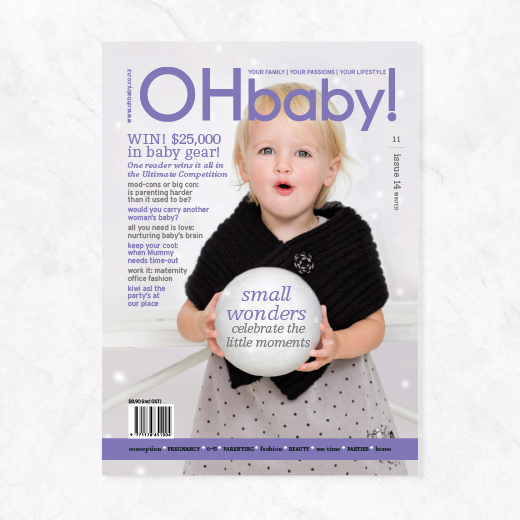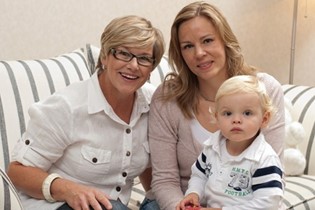Hypno birthing

After the difficult birth of her first child, Natasha Berman turned to hypno-birthing techniques of self-hypnosis, breathing and visualisation for her next pregnancy - and experienced a dream birth.
When you talk to people about hypno-birthing for most it conjures up visions of hippies humming while giving birth under the full moon outside in the garden. I must say this actually sounds like quite a lovely way to give birth but it's not the reality for most of us.
Hypno-birthing offers a relaxing, rewarding, stress-free method of giving birth. It's based on the belief that all babies should come into the world in an atmosphere of gentleness, calm and joy. It is as much a philosophy as it is a technique. I am the proud mother of two boys, and had two entirely different birth experiences. Here is the story of my path to hypno-birthing:
When things don't go to plan
The week I found out I was pregnant with my first child, Eli, now three, my beloved mother passed away after a long battle with cancer. The morning I went to tell her I was having a baby she had slipped into a non-responsive state. I felt that the moment I had always imagined had been taken from me. This started a long and very deep grieving process for me while I was growing my baby. Physically, the pregnancy itself was a breeze but emotionally it was very difficult for obvious reasons. To prepare for the birth I did all the "right" things - took my supplements, read books, attended antenatal classes, did aqua-natal classes, got lots of rest but in hindsight I feel as if nothing actually prepared me for what was to come or gave me actual skills to work with during the birthing process.
After a very long (37 hours) and traumatic labour (I will spare you the details), and with a lot of help from the medical staff, I finally gave birth to my 4.4kg (9lb 10oz) son. Soon after I haemorrhaged and passed out. I found it very difficult to bond with my baby at first, and after coming home from the hospital and Birthcare I was thrown into the realities of motherhood. Once again, I had no skills nor had I any idea how to care for this baby, and with no mother around my 18-month battle with postnatal depression began.
Calm and focused
Needless to say, after a less than positive experience with Eli's birth, I wanted more for the arrival of my second son. As I write this, little Asher is three weeks old. The last few weeks of my pregnancy with him were a little frustrating as I had about three or four false starts. But every day I practised my hypno-birthing and visualised the birth I wanted, along with looking after my very active almost-three-year-old. One Wednesday I woke up in the morning and knew it was the day. I took Eli to kindy as it was to be his third birthday in two days and I didn't want him to miss out on being a special birthday boy. I spent the morning enjoying my little son in his delight while I had mild, irregular contractions. After getting home, I spent a fair bit of the afternoon in bed while my husband looked after Eli. I felt calm and knew to rest and practise breathing through these early contractions. My husband Mark had a work meeting at 6pm so I got out of bed, fed, bathed and read stories to Eli and got him into bed. I remember standing over him looking at him, knowing his world would be different in the morning, it made me cry - I'm not sure why. Over the next few hours I paced around the house, the contractions were getting stronger but I remained calm and focused. Just as I was about to call Mark he arrived home. At this stage the contractions were 15 minutes apart so I knew we had plenty of time. I decided to have a bath and sent Mark to bed for a couple of hours. Two hours later I got him up. Within an hour the contractions had gone from 15-12-9-6-3 minutes apart very quickly! We called our midwife Melissa Dorr and support person. Over the next two hours I went deep within myself - I barely said a word while breathing through each surge. I didn't notice anyone else around. Mark talked me through some of the exercises we had learnt to help keep me focused on my vision for this birth. Around 4am I got into the pool which was lovely and warm and gave me a huge amount of comfort. I remained calm and quiet and allowed and trusted my body to know what to do. My midwife broke my waters and just five pushes later my beautiful baby boy was born drug-free at home in the water, in exactly the way I had envisaged. Asher was born the day before Eli's birthday. My beloved mother always hoped I'd have twins, siblings a day apart will hopefully keep her happy!
Giving birth at home in a drug-free environment surrounded by loved ones has certainly given me what I call a "Superwoman" feeling. There is nothing more amazing than trusting your body to do exactly what it is designed to do. Having had two completely different experiences of childbirth I believe without a doubt that the tools and breathing techniques I learned helped turn Asher's birth into a dream experience.
Why choose hypno-birthing?
Through a programme of deep relaxation, breath work, self-hypnosis and antenatal education, hypno-birthing allows a woman to summon her natural instincts and give birth in safety and with ease. Hypno-birthing is based on the belief that pain and fear are not natural components of birthing, that birth should be a fulfilling and empowering experience. When a mother is properly prepared physically, mentally and spiritually, she can experience the birth more easily and comfortably.
Hypno-birthing has its roots in the early 1900s when English obstetrician Dr Grantly Dick-Read's research showed how women who were calm seemed to experience far less pain in childbirth than women who were frightened. US hypnotherapist Marie Mongan took up this idea and developed hypno-birthing in the early 1990s. Through self-hypnosis women were taught to put themselves into a deeply relaxed state which greatly lessened the pain of childbirth.
Women opt for hypno-birthing to...
- Eliminate the fear-tension-pain syndrome of giving birth.
- Eliminate or greatly reduce the need for chemical painkillers.
- Shorten the first stage of labour.
- Eliminate fatigue during labour, leaving the mother relaxed, awake and with energy for the birth.
- Avoid the risk of hyperventilation from "shallow" breathing.
- Promote bonding of mother, baby and the birth companion.
- Create a more integral role for the birth companion, who becomes a trusted assistant, rather than onlooker.
- Foster a quicker postnatal recovery.
- Return birthing to being the beautiful, peaceful experience nature always intended.
What do you learn at a hypno-birthing class?
Auckland-based Amanda Collier is one of 18 registered hypno-birthing practitioners in New Zealand. She's also a registered nurse. She says her clients are split 60/40 between first-timers and couples having their second or subsequent child.
Amanda says she has mums and dads writing to her, raving about what a wonderful birth experience they've had. In fact, one first-time mum even said just three weeks after giving birth it was so fabulous she "couldn't wait to do it again".
Amanda says hypno-birthing should be undertaken as well as, rather than instead of, other antenatal or medical care. During a hypno-birthing class you will be taught a variety of techniques in relaxation, breathing and visualisation to help you stay in control of your labour and birth. For instance, if you imagine you are swinging gently in a hammock, your body responds as if you are because the subconscious doesn't know what is real and what is not.
There is also a big focus on arming the father/partner with the tools he needs to help the woman deliver in as calm a state as possible. They will be taught how to anchor Mum in that relaxed place where she's free to go within herself and doesn't need to think about anything else. For instance, your birth partner might press you on the shoulder while saying "relax deeply". When you hear the voice and feel the touch of someone you trust and who you know loves you, it will help keep you calm.
These tricks of building trust between you and your partner will help release endorphins in your body which are a natural blocker of pain.
Amanda says the thing that impedes birth most is fear and tension and hypno-birthing is merely a school of thought that encourages you to use your mind to overcome those barriers. She says many women have a hypno-birth without actually realising it.
"Mother Nature lets you do that," says Amanda.
She says it's important for women to find a midwife or LMC who will support them in their aim to have a hypno-birth. She says some midwives think everyone should have an epidural, but the more women there are who experience a positive hypno-birth the more midwives learn that hypno-birthing is to be encouraged.
"At the end of the day it makes their job easier."
Natasha Berman is a naturopath, medical herbalist and managing director of qbaby. Natasha has two sons, Eli and Asher. Read more at qbaby.co.nz and allergenicstesting.com.

AS FEATURED IN ISSUE 14 OF OHbaby! MAGAZINE. CHECK OUT OTHER ARTICLES IN THIS ISSUE BELOW

















